The investment opportunity
BERGÉ operates a network of ports and logistics services across Spain and Latin America (Mexico and Colombia), positioning it to benefit from rising global trade flows and growing demand for modern port infrastructure. Many ports in these regions face capacity constraints, ageing systems or opportunity to upgrade terminal and logistics services.
The business case
A.P. Moller Capital and Bergé y Compañía have formed a strategic partnership to grow BERGÉ into the leading ports infrastructure company in Iberia and Latin America, with A.P. Moller Capital acquiring a 51% stake in the port operator.
The strategic partnership will permit BERGÉ to expand further in its growth trajectory with capital from both parties and the added support of an experienced partner like A.P. Moller Capital with deep operational experience in the wider logistics industry.
Positive social impact
BERGE contributes to people’s well-being by facilitating access to essential goods through the supply of products in all industries. Its purpose is to build a more connected and efficient world by helping to meet vital societal needs through the movement of goods. Backed by A.P. Moller Capital, the business benefits from a framework of high standards in governance and safety, guided by the firm’s deep-rooted purpose of “doing well while doing good.”
Facts
The investment opportunity
Vietnam is among the fastest-growing logistics markets globally, supported by c. 7% GDP growth, significant electronics exports, and FDI inflows from global OEMs such as Samsung, LG, and Foxconn. Air freight volumes through Hanoi are rising at a steady pace given the deep hinterland of manufacturing across the North of Vietnam. The ‘China+1’ supply chain shift is driving demand further for high-quality, internationally governed cargo terminals.
ALS Cargo Terminal is a leading air cargo handling company operating at Noi Bai International Airport in Hanoi, Vietnam, with a strong market position and a reputation for efficient and high-quality service among major international airlines. At the time of A.P. Moller Capital’s investment in 2025, the terminal could handle up to 250,000 tonnes of cargo annually.
The business case
A.P. Moller Capital’s investment in and strategic partnership with ALS Cargo Terminal represents a significant opportunity to capitalise on Vietnam’s rapidly growing trade with international markets and reflects our strong conviction in the country’s long-term economic fundamentals. Key sources of value creation are underpinned by unlocking ALS Cargo Terminal’s potential in process optimisation, strategic expansion and a strong focus on sustainability and ESG.
The investment marks the launch of a broader platform strategy in Vietnam’s transport and logistics sector by A.P. Moller Capital in partnership with VinaCapital, one of Vietnam’s largest investment management companies.
Positive social impact
By supporting ALSC, this investment will help to alleviate bottlenecks at Noi Bai International Airport and ensure efficient export flows as trade volumes continue to surge. By providing reliable cargo handling capacity, these improvements support ongoing foreign direct investment from global OEMs such as Samsung, LG, and Foxconn, reinforcing Vietnam’s position as a ‘China+1’ manufacturing hub and enhancing its competitiveness in global supply chains.
A.P. Moller Capital’s ESG framework will guide the operations of ALSC, with a clear roadmap toward achieving a net-zero carbon footprint, combining economic growth with responsible, sustainable practices.
Facts
The investment opportunity
Southeast Asia is the 5th largest economy in the world and the 4th largest energy consumer in the world. 75% of electricity is currently derived from fossil fuels, highlighting significant untapped potential for renewable energy expansion in the region. Southeast Asia has vast renewable energy resources that result in potential capacity that is 40-50x larger than current demand.
Falling technology costs, refined tariff schemes, policy support and restrictions on coal-fired/fossil fuel power sources in the region are driving the energy transition.
Verdant Energy will focus primarily on greenfield rooftop solar projects in Southeast Asia, with core markets being Vietnam, the Philippines, Thailand, Indonesia, and Malaysia.
The business case
Verdant Energy represents an opportunity to set up a renewable energy platform that allows for a controlled and tailored deployment in order to target specific markets and sectors. The management team has a track record of building out a renewable energy platform in Southeast Asia, with decades of experience in project origination, development, construction, O&M, and securing PPAs. The team’s vast network spans across local authorities, businesses, off takers, suppliers and contractors.
Positive social impact
Verdant Energy aims to develop clean energy across Southeast Asia. The energy transition (renewables) focus will provide easier access to clean energy and contribute to the reduction of GHG emissions in the focus regions.
Facts
The investment opportunity
Vector Logistics is an important and well recognized player in the domestic distribution of cold foodstuff products in Southern Africa.
Vector operates 26 cold storage warehouses across Southern Africa in South Africa, Zambia, Botswana, and Namibia. The warehouses offer unique regional coverage unmatched in the market. From its warehouses Vector delivers over 470,000 cases daily to approximately 6,000 customer points servicing a combined area of more than 3.3 million square kilometers, or about the same area as all of Western Europe.
The business case
Vector is one of the largest multi-temperature logistics companies in Southern Africa and a provider of critical food infrastructure solutions to its customers. With 7000 employees operating from 26 distribution sites Vector uses 550 vehicles to serve both food producers and major retailers, wholesalers and the food service industry.
Vector and A.P. Moller Capital will leverage their combined logistics expertise to drive value creation through both vertical and horizontal expansion and will drive the transformation into a dynamic and independent company, positioning Vector as a stronger company poised for growth.
Positive social impact
Vector ensures food safety and freshness by managing temperature levels throughout the cold chain. The company maintains over 12 food safety certifications and licenses, rigorously monitor temperatures, and employ quality control measures to prevent non-compliant and unsafe products from reaching consumers.
Vector prioritizes sustainable practices to minimize food waste and environmental impact. The company is actively engaged in waste reduction efforts, converting food waste into valuable animal feed, and fostering a broader culture of recycling awareness.
In addition, Vector has proactively undertaken multiple carbon reduction initiatives, exemplified by its shift towards clean energy sources such as solar, wind, and biodiesel at select locations. A.P. Moller Capital will help facilitate the acceleration of Vector’s efforts, thereby providing its customers with a path to decarbonization of the supply chain.
Facts
The investment opportunity
HAU Logistics is a value-added warehousing and logistics platform comprising assets aimed at facilitating the flow of goods to and from Egypt; improving access to high quality warehousing and enhancing food security.
Egypt represents 22% of the overall MENA population and c. 11% of GDP for the region, as per the World Bank. Despite recent macroeconomic challenges, GDP forecasts remain between c. 3 – 5% over the next few years. As Egypt’s population grows and global trade volumes expand, coupled with the surge in e-commerce popularity, the demand for Grade A warehouses in major cities like Cairo is on the rise. These warehouses are crucial for facilitating efficient logistics and timely distribution of goods.
Hassan Allam Utilities, the investment and development arm of Hassan Allam Holding, is a reputable partner with established relationships and track record in Egypt, and therefore adds significant value to the platform.
The business case
HAU Logistics represents an opportunity to invest in critical and modern logistics infrastructure (air cargo handling facilities, logistics parks, inland dry ports and terminals) with potential to scale, through (i) the acquisition of other warehousing and logistics assets, (ii) the development of new projects and (iii) delivering operational value-adds.
The initial set of assets include the leading independent air cargo handling facility in Cairo International Airport (CACC Cargolinx) and a grade-A warehousing and logistics park currently under-construction (East Cairo Logistics Park), both of which operate under long term concessions / leases and provide high-quality logistics solutions to blue-chip customers.
As of June 2023, CACC Cargolinx recorded YTD volumes of 44.1k tons of air cargo.
Positive social impact
The essential infrastructure assets contained within the platform enable the movement of goods to and from Egypt; thereby creating jobs, facilitating trade and improving food security and supply.
On an annual basis, CACC Cargolinx supports an estimated 1,100 local jobs and contributes c. USD 27m in GDP. East Cairo Logistics Park is estimated to support 2,168 jobs and contribute an estimated USD 43m to GDP over the entire construction period, as well as 156 jobs and USD 12m in GDP per year during operations.
Facts
The investment opportunity
KEG Holdings (KEG) owns and operates the largest liquefied petroleum gas (LPG) import terminal in Sub-Saharan Africa as well as the largest LPG downstream distribution business in Kenya.
Today, approximately 80% of households in East Africa rely on solid cooking fuels such as wood and charcoal, which contribute to deforestation and cause indoor air pollution with adverse health consequences. This investment supports the transition away from the use of solid fuels and towards the use of LPG, a cleaner and more efficient method of cooking in East Africa.
The business case
KEG, through its marine terminal and storage facility, offers the lowest cost route for LPG import into Kenya, the largest market in East Africa.
Its import terminal services are provided under a 30-year license.
KEG’s downstream distribution business has demonstrated the ability to scale from market entry to market leadership in Kenya in under four years. This can be replicated to drive regional expansion in Rwanda and Uganda.
Positive social impact
The use of LPG for cooking in Kenya has grown by 20% p.a. since 2016 and is expected to reduce deforestation with approx. 100 million trees preserved as consumers replace firewood with LPG.
For every household converted from using charcoal to LPG, approximately 1 tonne of C02 emissions are saved per annum. It is estimated that KEG’s businesses will avoid more than 5 million tonnes of CO2 emissions during our hold period. The increased usage of LPG for cooking will improve air quality which is expected to benefit more than three million people.
Further, KEG’s businesses employ over 1,500 direct workers today and thereby support the local economy.
Facts
The investment opportunity
Cape Verde is a sparsely populated archipelago that has built a reputation as a peaceful tourist destination and has a strong claim to be the safest country in Africa. Cape Verde has one of Africa’s best investment climates and a currency pegged to the Euro.
Cabeolica owns four wind farms on four different islands meeting 18% of Cape Verde’s electricity demand, a demand which would otherwise have been generated by oil fired power plants. The project is in successful operation since 2011 and is a cornerstone power project in Cape Verde.
The investment was signed in December 2020 and closed in October 2021.
The business case
The company will be replacing oil fired energy generation with clean wind energy and thereby supporting the government’s climate change commitments. The investments will mean reduced dependency on volatile oil imports and strengthen the Cape Verde economy
Cabeolica is a stable operating business, but with substantial improvement potential, e.g., improved grid management will reduce curtailment, increase wind penetration and improve project returns.
Positive social impact
Cabeolica has financed and supported innovative and comprehensive biodiversity studies and conservation efforts for endangered birds species (including the installation of artificial nesting platforms) and an endemic gecko on the host islands.
Facts
The investment opportunity
The market for outsourced energy solutions in Africa is attractive. Hence, industrial group Reunert and A.P. Moller Capital, has established a joint venture, Lumika Renewables. The company will develop a portfolio of cost efficient, renewable energy solutions for commercial and industrial customers in Africa.
Reunert and A.P. Moller Capital is uniquely positioned to capitalise on this opportunity through Reunert’s track record in the energy solutions space and A.P. Moller Capital’s long-term experience in investing in infrastructure in growth markets will furthermore support Lumika Renewables’ expansion into African countries where A.P. Moller Capital already has existing networks.
The vision of Lumika Renewables is to be the leader in Africa in terms of developing clean, cost efficient, reliable energy solutions for corporate off-takers in Africa.
The business case
Lumika is derived from a combination of the words ‘illumination’ (lum) + Africa (ika) and is positioned as a beacon of light for businesses across Africa by empowering customers – literally in the form of clean, cost-efficient power, and figuratively through the empowerment of a bright future for African Industry. Lumika Renewables will be a catalyst for growth.
Lumika Renewables will target customers in commercial, light industry, heavy industry, agriculture and mining. It will differentiate itself through its access to funding, being technology agnostic, having an integrated value chain with in-house design resources and a pan-African presence.
Lumika Renewables will design, build and finance renewable based energy solutions for commercial and industrial customers in Africa through, among others, the installation of solar panels supplying green energy and providing software that creates transparency in terms of energy consumption.
Positive social impact
The energy solutions Lumika Renewables offer will lower the high cost of energy, reduce the reliance on fossil energy sources and – in the end – help African businesses to become more cost competitive and lower their impact on the environment by lowering their carbon footprint.
Lumika Renewables will create green energy jobs in Africa while introducing beneficial financing and world-class engineering, procurement and construction into the rapidly growing market of distributed generation.
Facts
The investment opportunity
Ivory Coast is one of the most diversified and stable growing economies in Africa. It has a well-functioning and economically balanced power market.
Energy demand is growing at 8% annually, led by manufacturing and mining sectors. The government has committed to meet power demand by increasing installed Independent Power Plants (IPP) generation capacity by approximately 150 MW each year.
The business case
Eranove is a well-managed African company with a proven track record in the power and water sectors in Ivory Coast. The company provides critical infrastructure assets facilitating economic growth and prosperity for society and for shareholders. The Eranove power plants benefit from strong contractual frameworks, supportive Ivorian economics and power market growth.
Positive social impact
Eranove provides much needed new power plants in Africa. In Ivory Coast, Eranove implements the ambitious “Electricity for All” programme. CIE operates a power network which is seen as a good example in Africa, with limited outages and which is economically balanced.
Facts
The investment opportunity
Grain terminals are essential transport infrastructure: modern facilities enable more efficient trade, linking supply with demand for key food products. As one of the largest consumers of cereal products in Africa, Morocco relies heavily on imports to satisfy consumers’ preferences for high-quality grains.
In November 2020, A.P. Moller Capital acquired a 49% shareholding in Mass Céréales al Maghreb, the leading grain terminal operator in Morocco. This investment provides an effective platform for A.P. Moller Capital to develop agri-bulk logistics infrastructure across Africa.
The business case
Mass Céréales al Maghreb is the concession holder and operator of two grain terminals located at the ports of Casablanca and Jorf Lasfar. The company provides handling services and storage of bulk cargoes, contributing to improvements in grain carriers’ productivity and overall port traffic. The company intends to build on its proven track record to become the leader in grain logistics infrastructure across Africa. The company’s first international initiative is the ongoing construction of an industrial bagging and storage facility near the new port located in Bargny-Sendou, Senegal, where it will help facilitate importation to Senegal as well as neighbouring Mali.
Positive social impact
Positive impacts include local jobs both at Mass Cereales and further down the grain/cereals value chain involved in processing and retail. The grain sector is of critical importance to Morocco. Morocco is a significant importer and has one of the highest per capita consumptions of grain in the world. The grain and cereals sector is one of the top government priorities, considering its economic and social importance. The sector represents up to 20% of the GDP generated by the country’s agricultural activities. Grain (including fodder) crops mobilise up to 75% of the total cultivated lands in Morocco. The sector has a major social weight, as grain crop remains the predominant activity for most of Moroccan farmers, particularly smallholders. Imports are needed to secure stable supply over the year and during years of low rain.
Facts
The investment opportunity
Nigeria, Africa’s largest economy and home to Africa’s largest population, has significant power supply challenges. Nigeria’s power sector is burdened by poor transmission and distribution infrastructure resulting in frequent blackouts and reliance on diesel fired generators, which are expensive and cause high levels of pollution. The inadequate power infrastructure makes achieving reliable power a challenge for industries and commercial businesses that operate in Nigeria.
In April 2019, A.P. Moller Capital invested in Impala Energy Holdings (Impala) a commercial and industrial Gas-to-Power platform with the goal to provide low cost, reliable and clean power to users in Nigeria.
The business case
Impala is a power development company focused on small to medium sized clean and renewable power projects in Sub-Saharan Africa. With its first project, Impala will develop captive compressed natural gas-based energy from ‘flared gas’ facilitating the generation of 60MW clean power. The project will result in a net greenhouse gas emission saving, cleaner air, employment and ecosystem services for local communities, as well as more affordable and reliable power for local companies.
Positive social impact
The project provides power to commercial and industrial customers by capturing and distributing previously flared natural gas. This reduces the GHG emissions associated with flaring. Other benefits of avoided flaring include the release of air emissions, noise and light pollution to the local area.
In 2020, PEL captured and sold almost 3.68 million SCUM natural gas from flare gas as a part of the Nigeria Flare as Reduction Program. Given the customers served by PEL do not have access to piped natural gas and would largely otherwise use diesel if they did not purchase gas, we have estimated the associated GHG savings from August to December 2020 to have been 2,400 tCO2eq.
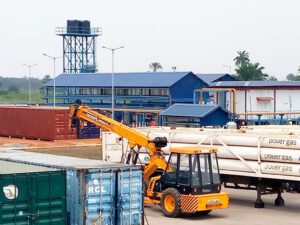
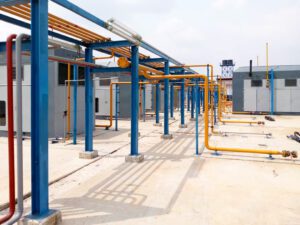
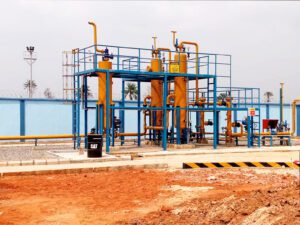
Facts
The investment opportunity
Kenya has a well-structured power market with unbundled and partially privatised transmission, generation and distribution activities as well as cost reflective tariffs. The country has a sizeable and growing economy with no significant dependency on one specific sector making the economy more diverse and stable.
Kenya generates more than 90% of its energy from renewables and thermal plants play a critical role in providing operational reserve and peak capacity to the system, avoiding power outages and reducing reliance on individual generators. All thermal plants run on heavy fuel oil and there is an opportunity to convert these plants to gas to support Kenya in its transition to cleaner energy.
In April 2020, A.P. Moller Capital made its first investment in Kenya with the acquisition of Iberafrica, a 53MW thermal power plant. Iberafrica is located in the industrial and populated area of Nairobi, the region with the highest demand for electricity in Kenya.
In March 2022, A.P. Moller Capital closed its second investment in the Kenyan power sector with the acquisition of Thika Power, an 87MW thermal power plant. Thika Power is also located in Nairobi and has been providing reliable power to the grid since the start of its operations in 2014.
The business case
Gas-fired power plants have an important role to play in providing base load power in high-growth economies such as Kenya as they are often a cleaner substitute to more common solutions.
Iberafrica and Thika Power, via the East Africa Infrastructure Platform, provide base load and reliable power to the grid and are operated by highly experienced local management teams with extensive knowledge of the Kenyan energy market. Both plants sell electricity to the national utility Kenya Power and Lighting Company Plc under long-term power purchase agreements.
The East Africa Infrastructure Platform allows us to continue pursuing our overall strategy of building scale in the attractive and growing power sector in Kenya and being a key stakeholder supporting the country’s transition to cleaner energy sources. Conversion of both Iberafrica and Thika Power to gas/LNG, with option to switch to green fuels when available locally, remains a key priority for A.P. Moller Capital.
Positive social impact
Through electricity generation and prevention of load shedding, Iberafrica’s power generation is estimated to have increased production time, supporting a total output of USD 150 million and contributed USD 80 million to the GDP, the majority of which goes to business as savings, as well as supporting around 10,800 jobs.
As a responsible investor in Iberafrica, we have ensured concrete actions to reduce GHG emissions were implemented at the plant itself. Electricity and fuel savings in 2020 amounted to 94,785 kWh and 63,255 litres, respectively. Energy saving initiatives that will be completed in 2022 include the installation of solar collectors and solar PV panels on site to reduce the plant’s auxiliary electricity and fuel consumption. Iberafrica also signed an agreement with the Kenyan Forestry Research Institute to fund reforestation activities supported by the Government of Kenya.
We have engaged with key stakeholders in Kenya to convert both Iberafrica and Thika Power from using HFO to gas/LNG. We expect this to also provide socio-economic benefits by lowering the cost of power for consumers. Conversion of both plants to gas/LNG is estimated to reduce CO2 emissions by c. 22k tCO2e per annum. In addition to conversion to gas/LNG, and leveraging our experience in Iberafrica, we will aim to improve efficiency and reduce emissions of Thika Power with installation of solar PV panels and solar collectors to reduce auxiliary electricity and fuel consumption of the power plant.
Facts
The investment opportunity
Efficient infrastructure is vital for economic growth and development of the African continent. Sub-Saharan Africa continues to be one of the fastest growing regions globally, and investing in the local infrastructure ecosystems of ports, trucking, warehouses, and rails, is vital to support local prosperity.
In January 2020, A.P. Moller Capital invested in ARISE Ports & Logistics, which comprises of two operational assets in Gabon:
And an advanced greenfield port in Ivory Coast:
This investment provides A.P. Moller Capital with an opportunity to create a strong partnership for ports and logistics businesses in West Africa.
The business case
ARISE Ports & Logistics (ARISE P&L) is a joint venture between A.P. Moller Capital, the Africa Finance Corporation and Olam International Limited. It carries out port and integrated multimodal logistics operations for various customers and commodities. The platform is an infrastructure ecosystem of ports, trucking and rail services, which facilitates effective trade and creates a foundation for local growth.
A.P. Moller Capital will leverage its industrial knowledge and network. With our partners we plan to grow the portfolio through capacity expansions or additional projects in West Africa.
Positive social impact
The investments made by ARISE in port infrastructure aim to enable trade by reducing transport costs and creating efficient transport/logistics corridors, thereby benefitting the national and regional economic development and creating jobs. In Gabon, the two operational port terminals are key in the country’s development plan (the Strategic Plan Gabon Emergent) to transition from an oil-exporting economy to a diversified and sustainable economy based on the mining, metallurgical, wood and agriculture sectors. To emphasise the additional value of infrastructure projects, we commissioned a study to estimate the impact of ARISE investments on enabling trade in Gabon specifically. The results show that around 71,680 additional jobs were enabled by the AIF terminals, and USD 718m in value added.
ARISE P&L adheres to the IFC PS and is committed to contributing to carbon emission reduction efforts.
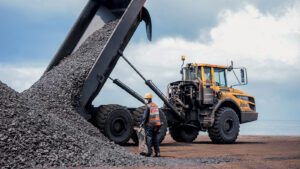
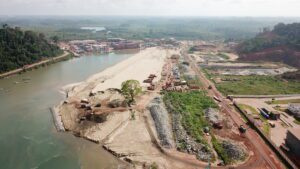
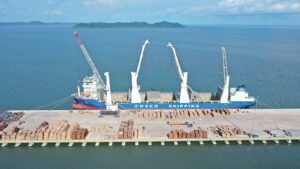
Owendo Mineral Port – facts
New Owendo International Port – facts
Port of San Pedro – facts
postal address
Tuborg Havnevej 15, 2900 Hellerup, Denmark
visiting addresses
Tuborg Havnevej 15, 2900 Hellerup, Denmark
Al Fattan Currency House, Tower 2, Level 15
Unit 1503, PO Box 507271, DIFC, Dubai, United Arab Emirates
Al Maryah Tower, Level 7, Unit 33,
PO Box 764728, ADGM, Abu Dhabi, United Arab Emirates
Marina Bay Financial Center Tower 1, 14th Floor, Singapore
© A.P. Møller Capital P/S
Privacy Policy
Disclaimer & Disclosures
Copenhagen
A.P. Møller Capital P/S
Tuborg Havnevej 15
2900 Hellerup
Denmark
Dubai
A.P. Møller Capital P/S (DIFC Branch)
Al Fattan Currency House
Tower 2, Offices 1502 & 1503
DIFC, Dubai
United Arab Emirates
Abu Dhabi
A.P. Møller Capital (ME) Ltd
Al Maryah Tower
Level 7, Unit 33
ADGM, Abu Dhabi
United Arab Emirates
Singapore
A.P. Moller Capital (Singapore) Pte. Ltd.
Marina Bay Financial Center
Tower 1, 14th Floor
Singapore
A.P. Møller Capital P/S is governed and regulated by the Danish Financial Supervisory Authority as an Alternative Investment Fund Manager under CVR number 38284967 and Finanstilsynet ID 23129.
A.P. Møller Capital P/S (DIFC Branch) is regulated by the Dubai Financial Services Authority to provide advice and arrange deals in investments.
A.P. Møller Capital (ME) Ltd is regulated by the ADGM Financial Services Regulatory Authority, to provide advice and arrange deals in investments.
A.P. Moller Capital (Singapore) Pte. Ltd. is exempt from licensing to provide advice on investments to its shareholder.
GENERAL INQUIRIES
Melanie Beck
E: melanie.beck@apmollercapital.com
INVESTOR RELATIONS
Laura Coquis
E: ir@apmollercapital.com
MEDIA RELATIONS
Charlotte Balbirnie, John Thompson
T: +44 7989 528421, +44 7951 060859
E: media@apmollercapital.com
A.P. Moller Capital has implemented a Complaints handling procedure for its investors and has appointed the Head of Compliance as Complaints Manager.
If you have concerns related to our activities or those of our portfolio companies, you can use A.P. Moller Capital’s Grievance Mechanism to have them addressed.
A.P. Moller Capital has implemented a whistle-blower system and encourages you to help fight corruption, business crime and other unacceptable business conduct.